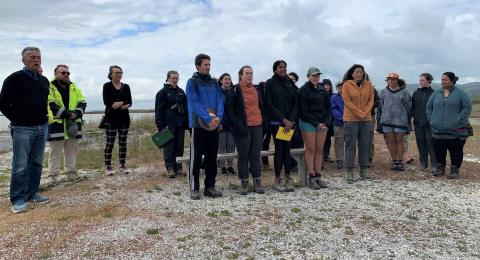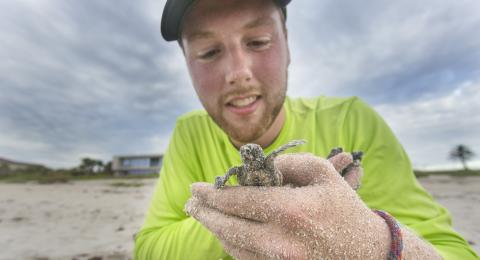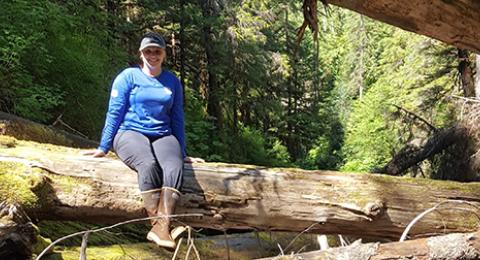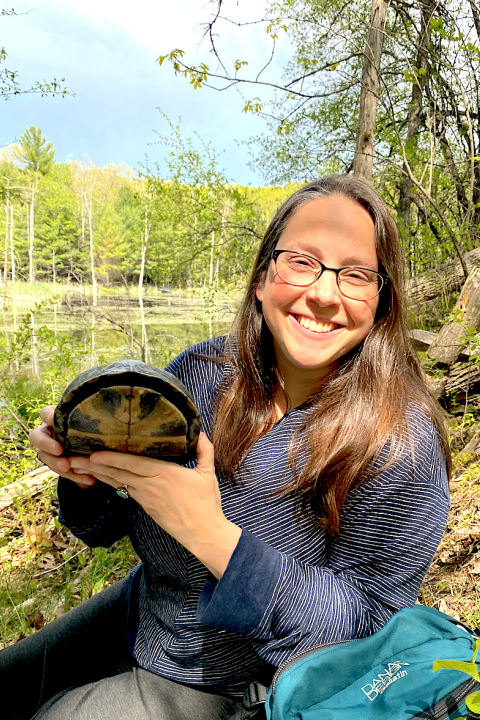The Wildlife and Conservation minor at UNH will immerse you in the study of natural habitats, biodiversity and sustainable practices. This minor integrates hands-on research and field experiences. It complements any major, offering a deeper understanding of environmental stewardship and broadening your professional opportunities in both public and private sectors.
What is wildlife and conservation biology?
The wildlife and conservation biology minor will provide you with a multidisciplinary introduction to managing and conserving wildlife and their habitats against the backdrop of human population growth, development, and climate change. In consultation with the minor coordinator, you will select your minor coursework from a diversity of field-based courses with an emphasis on hands-on experiences and upper-level courses that represent the multidisciplinary nature of wildlife and conservation biology. Students from a wide variety of majors can complete the wildlife and conservation biology minor to complement their primary focus of study, to explore their passion for wildlife and conservation, and to prepare for a wide variety of careers or future graduate studies.
Why study wildlife and conservation biology at UNH?
Located in the wildlife-rich state of New Hampshire, just minutes from the Atlantic Coast and an hour from the White Mountains, UNH is the perfect place for studying wildlife and conservation biology. Our program emphasizes hands-on experience through intensive lab and fieldwork, and students are encouraged to participate in faculty research projects involving a variety of wildlife species in areas including big game management, conservation biology, conservation genetics, endangered species management, landscape ecology and population ecology.
Potential career areas
- Conservation biology
- Environmental/ecology education
- Game/non-game management
- Land Management
- Research
- Science communication, outreach and engagement
- Wildlife conservation
- Wildlife rehabilitation
Curriculum & Requirements
The minor in Wildlife and Conservation Biology serves as a concentrated study, beyond a student's primary major, that allows students to explore their interest in wildlife ecology and conservation and their passion for nature and the outdoors.
- Academic policies related to Minors.
- The minor consists of completing a minimum of five courses (20 credits).
- Up to 8 credits can be used to satisfy both major and minor requirements.
- A maximum of two EcoQuest courses may be used to satisfy minor requirements.
- Additional courses from other study-abroad programs may be used toward the minor with permission.
| Code | Title | Credits |
|---|---|---|
| Required Courses | ||
| Category 1 | ||
| Select one course from the following: | 4 | |
NR 433 | Wildlife Ecology | |
NR 650 | Principles of Conservation Biology 1,2,6 | |
| Category 2 | ||
| Select at least one (up to 2) of the following courses: | 4 | |
NR 425 | Field Dendrology | |
NR 506 | Forest Entomology | |
or ZOOL 555 | Introduction to Entomology | |
NR 712 | Mammalogy | |
MEFB 628 | Marine Invertebrate Evolution and Ecology | |
ZOOL 542 | Ornithology | |
ZOOL 566 | Herpetology | |
ZOOL 710 | Sharks and Bony Fishes | |
| Category 3 | ||
| Select at least two (up to 3) of the following courses (and note that many have pre-requisites): | 12 | |
NR 615 | Wildlife Habitats 2,3 | |
NR 640 | Wildlife Population Ecology 2 | |
NR 641 | Wildlife Disease Ecology | |
NR 642 | Introduction to Biogeography 3 | |
NR 650 | Principles of Conservation Biology 1,2,6 | |
NR 664 | Conservation Genetics and Applied Evolution | |
NR 713 | Quantitative Ecology | |
NR 734 | Tropical Ecology | |
NR 740 | Inventory and Monitoring of Ecological Communities 2,4 | |
NR 765 | Community Ecology 3 | |
NR 795 | Investigations 5 | |
ZOOL 613W | Animal Behavior | |
or ZOOL 733W | Behavioral Ecology | |
| Total Credits | 20 | |
- 1
NR 661 is considered an appropriate equivalent for NR 650.
- 2
Enrollments are capped and admission is not guaranteed to those pursuing a minor.
- 3
NR 660 (at UNH-EcoQuest) can be used as a replacement for one, NR 615, NR 642, or NR 765.
- 4
NR 663 (at UNH-EcoQuest) is considered an appropriate equivalent for NR 740.
- 5
NR 795 requires working with an individual WCB faculty member on a special problem/issue.
- 6
NR 650 can only count towards either Category 1 or Category 3 (but not both).


















